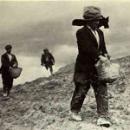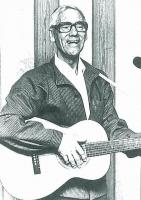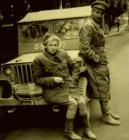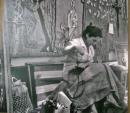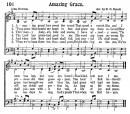בּעריאָזקעלע
Traduzione tedesca di Heinz Kahlau, in “Es brennt Brüder, es brennt: Jiddische Lieder”, a cura di Lin Jaldati ed Eberhard Robling, Berlino 1969 (1985).

KLEINE BIRKE
(Continues)
(Continues)
Contributed by Bernart Bartleby 2016/7/20 - 08:54
Canzone della libertà

dal disco Milva – Was Ich Denke (1979)
FREIHEIT IN MEINER SPRACHE
(Continues)
(Continues)
2016/6/27 - 00:17
Ballade von der Krüppelgarde

BALLADE VON DER KRÜPPELGARDE
(Continues)
(Continues)
Contributed by Juha Rämö 2016/6/10 - 09:11
Georges Brassens: Les passantes

German version by Michi and Herbert Killian (according to Fabrizio de André)
Deutschsprachige Version von Michi und Herbert Killian (nach Fabrizio de André)
Deutschsprachige Version von Michi und Herbert Killian (nach Fabrizio de André)
DIE PASSANTINNEN
(Continues)
(Continues)
Contributed by Juha Rämö 2016/5/16 - 11:39
Quello che non ho
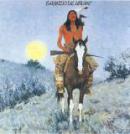
Deutsche Übersetzung von Michi und Herbert Killian
Fonte/Quelle
Fonte/Quelle
WAS ICH NICHT HABE
(Continues)
(Continues)
Contributed by Seppo Ilmarinen 2016/5/7 - 11:05
Красная Армия всех сильней (Белая Армия, Чёрный Барон)

Die Rote Armee / Weißes Gesindel und adlige Brut
L'adattamento tradizionale in lingua tedesca
Traditional Adaptation into German
Traditionelle deutsche Nachdichtung
(da/from/aus Hamburger Volksliederarchiv)
Rot Front. Neues Kampf-Liederbuch, Berlin 1925, Nr. 11 S. 19
Zum roten Sturm voran. Kampfliederbuch, Berlin 1926, Nr. 11 S. 19
Mit Lenin. 50 Kampflieder, 21.-40. Tausend (ca. 1928/29), Nr. 37, S. 23
Front Kämpfer Liederbuch, 21.-40. Tausend, Berlin 1928/29, Nr. 38 S. 24
L'adattamento tradizionale in lingua tedesca
Traditional Adaptation into German
Traditionelle deutsche Nachdichtung
(da/from/aus Hamburger Volksliederarchiv)
Fonti / Sources / Quellen:
Rot Front. Neues Kampf-Liederbuch, Berlin 1925, Nr. 11 S. 19
Zum roten Sturm voran. Kampfliederbuch, Berlin 1926, Nr. 11 S. 19
Mit Lenin. 50 Kampflieder, 21.-40. Tausend (ca. 1928/29), Nr. 37, S. 23
Front Kämpfer Liederbuch, 21.-40. Tausend, Berlin 1928/29, Nr. 38 S. 24
DIE ROTE ARMEE
(Continues)
(Continues)
Contributed by Riccardo Venturi 2016/5/6 - 22:00
Been on the Road so Long

Deutsche Fassung von Hannes Wader [1972]
Testo / Text : Hannes Wader
Musica / Musik: A. Campbell
Album: 7 Lieder
Testo / Text : Hannes Wader
Musica / Musik: A. Campbell
Album: 7 Lieder
La canzone era stata originariamente postata come canzone a se stante (9.8.2005)
SCHON SO LANG
(Continues)
(Continues)
Contributed by Riccardo Venturi (originariamente 9/8/2005) 2016/3/17 - 09:20
The Hangin Tree

Es wird von einem Mann gesungen, der vom Kapitol erhängt wurde, weil er angeblich drei Menschen getötet hat. Das Lied singt er für seine Liebste, die er vor dem Regime warnt und auffordert zu fliehen, selbst wenn dies nur möglich ist, indem sie sich das Leben nimmt und neben ihm auf dem Henkersbaum erhängt. Das Lied ist während der erstenRebellion entstanden und wurde ein Symbol für den Aufstand, weswegen das Kapitol das Singen des Liedes verboten hat.
Viele Jahre später lernten Katniss und ihre Schwester Prim das Lied von ihrem Vater und sangen es häufig aufgrund seiner einfachen und eingängigen Melodie. Als Prim anfing, Halsketten aus Seil zu basteln, war ihre Mutter wütend auf den Vater und verbot ihnen, das Lied zu singen. Erst als ihr Vater starb, erinnerte sich Katniss wieder an das Lied. Mit zunehmendem Alter erkannte sie, was die Worte bedeuteten und fand das Lied ein wenig gruselig.
Während... (Continues)
Viele Jahre später lernten Katniss und ihre Schwester Prim das Lied von ihrem Vater und sangen es häufig aufgrund seiner einfachen und eingängigen Melodie. Als Prim anfing, Halsketten aus Seil zu basteln, war ihre Mutter wütend auf den Vater und verbot ihnen, das Lied zu singen. Erst als ihr Vater starb, erinnerte sich Katniss wieder an das Lied. Mit zunehmendem Alter erkannte sie, was die Worte bedeuteten und fand das Lied ein wenig gruselig.
Während... (Continues)
LIED VOM HENKERBAUM
(Continues)
(Continues)
Contributed by Donquijote82 2016/3/1 - 09:30
Wenn alles grünt und blüht auf dieser Erde
Anonymous
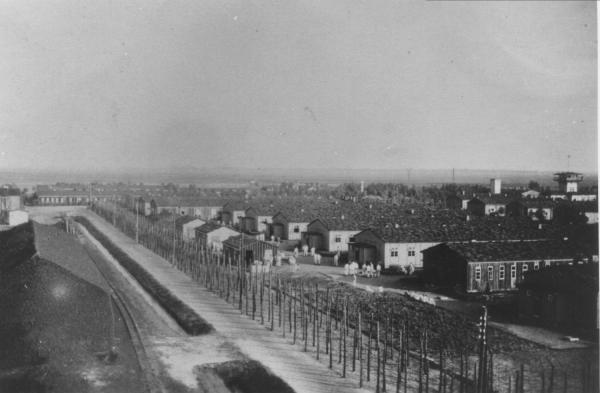
Una delle pagine abbozzate e poi dimenticate che qua e là emergono ogni tanto dalla sconfinata base di dati delle CCG/AWS...
A proposito di questa, mi sento di dire - caro Riccardo - che nel lontano 2008 prendesti un mezzo granchio se è vero, come mi pare, che “Wenn alles grünt und blüht auf dieser Erde” non sia altro che la celebrazione - seppur piena d’amore - dell’eroe teutonico morto eroicamente in battaglia, possibilmente nelle steppe sovietiche o di qualche altro paese occupato, una canzone che non a caso è presente nel “Liederbuch der Fallschirmjäger”, il canzoniere dei paracadutisti tedeschi...
Tuttavia, il motivo e la struttura di “Quando tutto è verde e in fiore sulla Terra” furono ripresi in un canto dei prigionieri - tra di loro molti soldati della Wermacht condannati dai tribunali militari - del campo di concentramento di Börgermoor, o di un altro dei 15 “Emslandlager” allestiti... (Continues)
A proposito di questa, mi sento di dire - caro Riccardo - che nel lontano 2008 prendesti un mezzo granchio se è vero, come mi pare, che “Wenn alles grünt und blüht auf dieser Erde” non sia altro che la celebrazione - seppur piena d’amore - dell’eroe teutonico morto eroicamente in battaglia, possibilmente nelle steppe sovietiche o di qualche altro paese occupato, una canzone che non a caso è presente nel “Liederbuch der Fallschirmjäger”, il canzoniere dei paracadutisti tedeschi...
Tuttavia, il motivo e la struttura di “Quando tutto è verde e in fiore sulla Terra” furono ripresi in un canto dei prigionieri - tra di loro molti soldati della Wermacht condannati dai tribunali militari - del campo di concentramento di Börgermoor, o di un altro dei 15 “Emslandlager” allestiti... (Continues)
WENN ALLES GRÜNT AND BLÜHT AUF EMSLANDS FLUREN
(Continues)
(Continues)
Contributed by Bernart Bartleby 2016/2/5 - 20:58
Kołysanka dla Birkenau

La musica dovrebbe essere quella della canzonetta tedesca degli anni 30 “Wenn ich groß bin liebe Mutter” interpretata da Marita Gründgens.
Su Volksliederarchiv trovo la traduzione tedesca di Doris Radojewski.
Su Volksliederarchiv trovo la traduzione tedesca di Doris Radojewski.
WIEGENLIED FÜR BIRKENAU
(Continues)
(Continues)
Contributed by Bernart Bartleby 2016/2/5 - 15:35
Onze luis heeft neten gekregen

UNSERE LAUS HAT NISSEN BEKOMMEN
(Continues)
(Continues)
Contributed by Bernart Bartleby 2016/2/2 - 13:23
La guardia rossa
Traduzione tedesca di autore anonimo da “Europa im Kampf 1939–1944”, come riportata su Chants Protestants

DIE ROTE GARDE
(Continues)
(Continues)
Contributed by Bernart Bartleby 2016/1/29 - 13:56
Rosso levante e ponente
Anonymous
Traduzione tedesca di Johanna Kootz da “Europa im Kampf 1939–1944”, come riportata su Chants Protestants
Johanna Kootz (1942-) è bbliotecaria, sociologa e studiosa di storia delle donne presso la Freien Universität di Berlino. Nel 1997 e nel 2007 ha pubblicato studi sull’esperienza delle donne prigioniere nel KZ Ravensbrück.
ROT DER OSTEN
(Continues)
(Continues)
Contributed by Bernart Bartleby 2016/1/29 - 09:04
Los campesinos (o Adelante campesinos)
Versione tedesca – non totalmente corrispondente all’originale nella seconda parte - di Lore Krüger, nata Heinemann (1914-2009), ebrea, combattente in Spagna, brevemente rinchiusa nel campo di Gurs, traduttrice e fotografa.

Trovata su Chants Protestants come tratta dall’edizione tedesca dell’antologia clandestinamente compilta nel KZ Ravensbrück intitolata “Europa u boji 1939 – 1944” (“Europa im Kampf 1939–1944. Internationale Poesie aus dem Frauen-Konzentrationslager Ravensbrück”, volume e CD a cura di Constanze Jaiser e Jacob David Pampuch, Metropol Verlag, Berlino, 2005)
DIE BAUERN SPANIENS
(Continues)
(Continues)
Contributed by Bernart Bartleby 2016/1/29 - 08:39
Compagnons, dormez vous?
Traduzione tedesca di Elfriede Czurda da “Europa im Kampf 1939–1944. Internationale Poesie aus dem Frauen-Konzentrationslager Ravensbrück”, volume e CD a cura di Constanze Jaiser e Jacob David Pampuch, Metropol Verlag, Berlino, 2005 (edizione tedesca dell’antologia “Europa u boji 1939 – 1944”), come riportata su Chants Protestants

SCHLAFT IHR KAMERADEN?
(Continues)
(Continues)
Contributed by Bernart Bartleby 2016/1/27 - 11:24
Appèl-gedachten (Onder de blauwe hemel)

UNTER DEM BLAUEN HIMMEL
(Continues)
(Continues)
Contributed by Bernart Bartleby 2016/1/26 - 15:56
Motýl
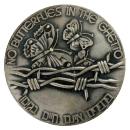
Pavel Friedman - 4/6/1942 - Theresienstadt
Über jungen Dichter Pavel Friedman ist nur wenig bekannt. Es ist davon auszugehen, dass er 17 Jahre alt war, als er das Gedicht ‚Der Schmetterling’ am 4. Juni 1942 im Ghetto Theresienstadt schrieb. Sein Arbeiten wurde nach dem Zweiten Weltkrieg zusammen mit Kinderzeichnungen in einem geheimen Versteck gefunden.
Pavel Friedman wurde nach Auschwitz deportiert, dort kam er am 29. September 1944 um.
Über jungen Dichter Pavel Friedman ist nur wenig bekannt. Es ist davon auszugehen, dass er 17 Jahre alt war, als er das Gedicht ‚Der Schmetterling’ am 4. Juni 1942 im Ghetto Theresienstadt schrieb. Sein Arbeiten wurde nach dem Zweiten Weltkrieg zusammen mit Kinderzeichnungen in einem geheimen Versteck gefunden.
Pavel Friedman wurde nach Auschwitz deportiert, dort kam er am 29. September 1944 um.
DER SCHMETTERLING
(Continues)
(Continues)
Contributed by Marco Valdo M.I. 2016/1/22 - 23:39
Giovanettini che andate alla guerra
Anonymous

Testo trovato su Lieder.net
IHR JUNGEN LEUTE
(Continues)
(Continues)
Contributed by Bernart Bartleby 2016/1/8 - 11:33
La chanzun s-charpada

Si tratta infatti espressamente di una "Nachdichtung" (rielaborazione, riscrittura). In pratica, fermi restando i concetti-base, ha assai poco a che vedere col testo originale romancio. [RV]
DAS ZERRISSENE LIED (NACHDICHTUNG)
(Continues)
(Continues)
Contributed by Bernart Bartleby 2015/11/11 - 10:37
Per tuots in praschun

FÜR ALLE IM GEFÄNGNIS
(Continues)
(Continues)
Contributed by Bernart Bartleby 2015/11/11 - 09:28
In memoria

Da: Frankfurter Anthologie (pagina culturale della Frankfurter Allgemeine)
Deutsche Übersetzung von Ingeborg Bachmann
Aus Frankfurter Anthologie (Kulturseite der Frankfurter Allgemeinen)
Mohammed Sheab, 26 Jahre alt, setzte seinem Leben im Sommer 1913 ein Ende. Zusammen mit seinem Freund Giuseppe Ungaretti war er aus dem ägyptischen Alexandria nach Paris gekommen, um an der Sorbonne zu studieren. Schon als Schüler hatten die beiden eine kleine Literaturzeitschrift herausgegeben, als Studenten teilten sie ein Zimmer in einem Hotel, das immer noch existiert, aber nicht mehr „schäbig“ ist, genau so wenig wie die rue des Carmes im Quartier Latin.
Mit Beginn des Ersten Weltkriegs kehrte Ungaretti, Sohn italienischer Auswanderer, in das Land seiner Eltern zurück und meldete sich 1915 als Freiwilliger an die Front. Dort, wo der Tod allgegenwärtig war, versah er alle Gedichte mit Datum und Ort... (Continues)
Deutsche Übersetzung von Ingeborg Bachmann
Aus Frankfurter Anthologie (Kulturseite der Frankfurter Allgemeinen)
Mohammed Sheab, 26 Jahre alt, setzte seinem Leben im Sommer 1913 ein Ende. Zusammen mit seinem Freund Giuseppe Ungaretti war er aus dem ägyptischen Alexandria nach Paris gekommen, um an der Sorbonne zu studieren. Schon als Schüler hatten die beiden eine kleine Literaturzeitschrift herausgegeben, als Studenten teilten sie ein Zimmer in einem Hotel, das immer noch existiert, aber nicht mehr „schäbig“ ist, genau so wenig wie die rue des Carmes im Quartier Latin.
Mit Beginn des Ersten Weltkriegs kehrte Ungaretti, Sohn italienischer Auswanderer, in das Land seiner Eltern zurück und meldete sich 1915 als Freiwilliger an die Front. Dort, wo der Tod allgegenwärtig war, versah er alle Gedichte mit Datum und Ort... (Continues)
IN MEMORIAM
(Continues)
(Continues)
Contributed by Riccardo Venturi 2015/10/30 - 20:17
Der Sheriff

[2003]
Scritta da Robert Görl e Gabriel "Gabi" Delgado-López
Singolo estratto dall’album “Fünfzehn neue D.A.F-Lieder”
Dedicato a George W. Bush all’alba della seconda guerra del Golfo.
Facile che questo brano sia stato concepito negli stessi giorni in cui lo era questo sito delle CCG/AWS…
Scritta da Robert Görl e Gabriel "Gabi" Delgado-López
Singolo estratto dall’album “Fünfzehn neue D.A.F-Lieder”
Dedicato a George W. Bush all’alba della seconda guerra del Golfo.
Facile che questo brano sia stato concepito negli stessi giorni in cui lo era questo sito delle CCG/AWS…
Wenn der Sheriff reiten geht, reiten alle mit
(Continues)
(Continues)
Contributed by Bernart Bartleby 2015/10/22 - 09:13
Song Itineraries:
George Walker Bush II
Der Mussolini
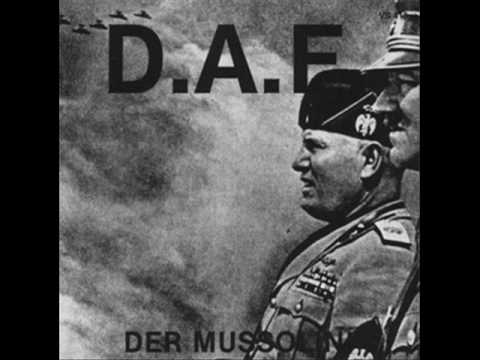
[1981]
Scritta da Robert Görl e Gabriel "Gabi" Delgado-López
Celeberrimo singolo estratto dall’album “Alles ist gut”
"Alzati, batti le mani, scuoti i fianchi, balla il Mussolini, balla l'Adolf Hitler, muovi il culo, balla il Gesù Cristo, balla il comunismo."… Elettronica iconoclasta.
Scritta da Robert Görl e Gabriel "Gabi" Delgado-López
Celeberrimo singolo estratto dall’album “Alles ist gut”
"Alzati, batti le mani, scuoti i fianchi, balla il Mussolini, balla l'Adolf Hitler, muovi il culo, balla il Gesù Cristo, balla il comunismo."… Elettronica iconoclasta.
Geht in die Knie
(Continues)
(Continues)
Contributed by Bernart Bartleby 2015/10/22 - 08:51
Bunker-Ballade

from the 1964 album »Wir wollen dazu was sagen - neue Lieder gegen die Bombe«:
Musica / Music / Musik: Dieter Süverkrüp
Testo / Lyrics / Text: Gerd Semmer
Musica / Music / Musik: Dieter Süverkrüp
Testo / Lyrics / Text: Gerd Semmer
Hey Billy, wir müssen unseren Bunker bau'n,
(Continues)
(Continues)
Contributed by Juha Rämö 2015/10/6 - 14:15
Der kriegerische Wolf
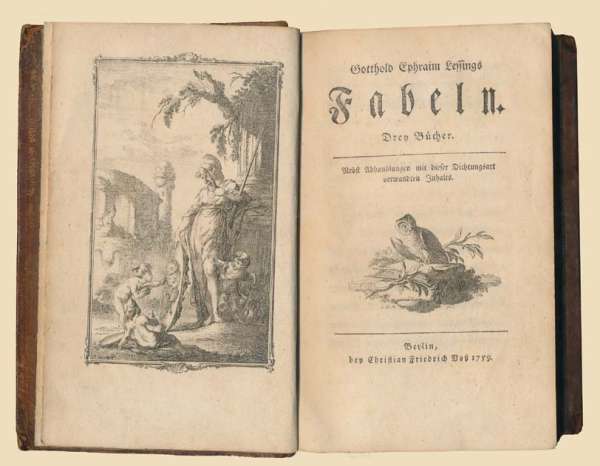
[1759]
Parole di Gotthold Ephraim Lessing (1729-1781), scrittore e drammaturgo tedesco.
Una delle sue “Fabeln” pubblicate nel 1759.
Musica per pianoforte e mezza voce di Gary Bachlund, prolifico compositore tedesco-americano, da “Fünf Fablen” (2008)
Testo trovato su The LiederNet Archive
Parole di Gotthold Ephraim Lessing (1729-1781), scrittore e drammaturgo tedesco.
Una delle sue “Fabeln” pubblicate nel 1759.
Musica per pianoforte e mezza voce di Gary Bachlund, prolifico compositore tedesco-americano, da “Fünf Fablen” (2008)
Testo trovato su The LiederNet Archive
"Mein Vater, glorreichen Andenkens," sagte ein junger Wolf zu einem Fuchse, "das war ein rechter Held! Wie fürchterlich hat er sich nicht in der ganzen Gegend gemacht!Er hat über mehr als zweihundert Feinde, nach und nach, triumphiert, und ihre schwarze Seelen in das Reich des Verderbens gesandt. Was Wunder also, dass er endlich doch einem unterliegen musste!"
(Continues)
(Continues)
Contributed by Bernart Bartleby 2015/7/27 - 11:17
In luogo e forma di Parnaso ho ’l core

ALS ICH IN MIR DEN PARNASSOS FAND
(Continues)
(Continues)
Contributed by Bernart Bartleby 2015/6/3 - 15:54
Vanini

[1798]
Versi del grande poeta tedesco Friedrich Hölderlin (1770-1843), nella raccolta “Gedichte 1784-1800”.
Musica del compositore austriaco Josef Matthias Hauer (1883-1959) nella sua opera “Fünf Lieder”, 1914.
Poesia dedicata a Giulio Cesare Vanini (1585-1619), filosofo, teologo, naturalista libero pensatore originario del Salento.
Ordinato frate carmelitano, poi transitato all’anglicanesimo e quindi tornato al cattolicesimo, spirito inquieto, profondamente critico verso il papato e convinto della necessità del superamento di una teologia d’impianto ancora medievale, razionalista radicale propugnatore dell’autonomia della ragione e della natura, innovatore della tradizione cristiana considerato eversore dai tradizionalisti, Giulio Cesare Vanini visse tra Inghilterra, Francia e Italia sempre spiato e braccato dagli sgherri dell’Inquisizione, fino a quando si decisero ad arrestarlo a Tolosa... (Continues)
Versi del grande poeta tedesco Friedrich Hölderlin (1770-1843), nella raccolta “Gedichte 1784-1800”.
Musica del compositore austriaco Josef Matthias Hauer (1883-1959) nella sua opera “Fünf Lieder”, 1914.
Poesia dedicata a Giulio Cesare Vanini (1585-1619), filosofo, teologo, naturalista libero pensatore originario del Salento.
Ordinato frate carmelitano, poi transitato all’anglicanesimo e quindi tornato al cattolicesimo, spirito inquieto, profondamente critico verso il papato e convinto della necessità del superamento di una teologia d’impianto ancora medievale, razionalista radicale propugnatore dell’autonomia della ragione e della natura, innovatore della tradizione cristiana considerato eversore dai tradizionalisti, Giulio Cesare Vanini visse tra Inghilterra, Francia e Italia sempre spiato e braccato dagli sgherri dell’Inquisizione, fino a quando si decisero ad arrestarlo a Tolosa... (Continues)
Den Gottverächter schalten sie dich? mit Fluch
(Continues)
(Continues)
Contributed by Bernart Bartleby 2015/6/3 - 10:11
Li pirati a Palermu

I pirati a Palermu“ (Die Piraten von Palermo) Der Schmerz angesichts der osmanischen Besetzung Siziliens wird hier über einem pulsierenden Dreiertakt in langgezogenen Kantilenen zu einer universellen Anklage gegen Unrecht und Unterdrückung.
Die Piraten in Palermo
(Continues)
(Continues)
2015/5/28 - 22:50
Menschenjäger

[1972]
Scritta da Rio Reiser, nome d’arte di Ralph Möbius, e Ralph Steitz.
Nell’LP intitolato “Keine Macht für Niemand”
Scritta da Rio Reiser, nome d’arte di Ralph Möbius, e Ralph Steitz.
Nell’LP intitolato “Keine Macht für Niemand”
Sie würden uns gern im Knast begraben
(Continues)
(Continues)
Contributed by Bernart Bartleby 2015/5/28 - 13:30
Sklavenhändler

[1971]
Parole e musica di Ralph Möbius (vero nome di Rio Reiser, leader della band, morto a soli 46 anni nel 1996)
Nel disco d’esordio di questa rock band tedesca, “Warum geht es mir so dreckig?”
Parole e musica di Ralph Möbius (vero nome di Rio Reiser, leader della band, morto a soli 46 anni nel 1996)
Nel disco d’esordio di questa rock band tedesca, “Warum geht es mir so dreckig?”
Zwo, Drei, Vier
(Continues)
(Continues)
Contributed by Bernart Bartleby 2015/5/28 - 11:46
Song Itineraries:
The War of Labour: Emigration, Immigration, Exploitation, Slavery
Mein Name ist Mensch

[1971]
Parole e musica di Ralph Möbius (vero nome di Rio Reiser, leader della band, morto a soli 46 anni nel 1996)
Nel disco d’esordio di questa rock band tedesca, “Warum geht es mir so dreckig?”
Ehi, non vorrei dire una minkiata (io non parlo il tedesco, scusami, pardon) ma questo è proprio il manifesto contro la “Guerra dei 10.000 anni che i ricchi fanno ai poveri”!
Marco Valdooo, pensaci tuuu!!!
Parole e musica di Ralph Möbius (vero nome di Rio Reiser, leader della band, morto a soli 46 anni nel 1996)
Nel disco d’esordio di questa rock band tedesca, “Warum geht es mir so dreckig?”
Ehi, non vorrei dire una minkiata (io non parlo il tedesco, scusami, pardon) ma questo è proprio il manifesto contro la “Guerra dei 10.000 anni che i ricchi fanno ai poveri”!
Marco Valdooo, pensaci tuuu!!!
Ich habe viele Väter.
(Continues)
(Continues)
Contributed by Bernart Bartleby 2015/5/28 - 11:36
Song Itineraries:
The War of Labour: Emigration, Immigration, Exploitation, Slavery
Europa
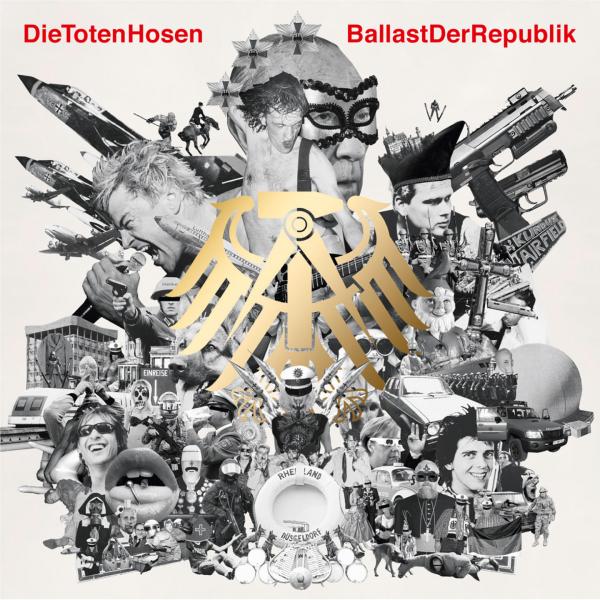
2012
Ballast der Republik
Canzone del gruppo tedesco Die Toten Hosen, che parla della difficile traversata dei migranti nel mediterraneo per raggiungere l'europa e della morte che molti di loro trovano in fondo al mare.
Ballast der Republik
Canzone del gruppo tedesco Die Toten Hosen, che parla della difficile traversata dei migranti nel mediterraneo per raggiungere l'europa e della morte che molti di loro trovano in fondo al mare.
Unten im Hafen setzten sie die Segel
(Continues)
(Continues)
Contributed by leoskini 2015/5/27 - 17:38
Song Itineraries:
The War of Labour: Emigration, Immigration, Exploitation, Slavery
Gesang der Reiskahnschlepper

[1930]
Ein Song von Bert Brecht mit Musik von Hanns Eisler
Aus dem Lehrstück Die Maßnahme
Un Song di Bert Brecht con musica di Hanns Eisler
Dal dramma didattico La linea di condotta
Se nel Lied des Händlers si sono visti i meccanismi bruti del capitalismo espressi, appunto nella maniera più chiara e brutale, da un capitalista (si conosce soltanto il prezzo della merce inanimata e animata, perché anche il lavoratore è merce), in questo Canto dei battellieri del riso gli stessi meccanismi sono espressi, in modo dolente ma altrettanto brutale, dal lavoratore-merce. Come nella Canzone del commerciante Brecht si serve ancora dei “Battellieri del riso” cinesi, gli ultimi degli ultimi in quanto pura merce addetta al durissimo trasporto di una merce di base ottenuta a sua volta con la schiavitù contadina. I battellieri sono dei “sottoschiavi”, se si può usare il termine. Sottoschiavi che tirano... (Continues)
Ein Song von Bert Brecht mit Musik von Hanns Eisler
Aus dem Lehrstück Die Maßnahme
Un Song di Bert Brecht con musica di Hanns Eisler
Dal dramma didattico La linea di condotta
Se nel Lied des Händlers si sono visti i meccanismi bruti del capitalismo espressi, appunto nella maniera più chiara e brutale, da un capitalista (si conosce soltanto il prezzo della merce inanimata e animata, perché anche il lavoratore è merce), in questo Canto dei battellieri del riso gli stessi meccanismi sono espressi, in modo dolente ma altrettanto brutale, dal lavoratore-merce. Come nella Canzone del commerciante Brecht si serve ancora dei “Battellieri del riso” cinesi, gli ultimi degli ultimi in quanto pura merce addetta al durissimo trasporto di una merce di base ottenuta a sua volta con la schiavitù contadina. I battellieri sono dei “sottoschiavi”, se si può usare il termine. Sottoschiavi che tirano... (Continues)
In der Stadt oben am Fluß
(Continues)
(Continues)
Contributed by Riccardo Venturi 2015/5/25 - 10:38
Song Itineraries:
The War of Labour: Emigration, Immigration, Exploitation, Slavery
Geh mit uns
Musica / Music / Musik: »Bye And Bye«
Testo / Lyrics / Text: Gerd Semmer
Testo / Lyrics / Text: Gerd Semmer
Halt, bleib stehen, geh nicht an uns vorbei.
(Continues)
(Continues)
Contributed by Juha Rämö 2015/5/24 - 15:33
Lied des Händlers, oder Song von der Ware, oder weiter Angebot & Nachfrage

[1930]
Ein Song von Bert Brecht mit Musik von Hanns Eisler
Aus dem Lehrstück Die Maßnahme
Un Song di Bert Brecht con musica di Hanns Eisler
Dal dramma didattico La linea di condotta
La foto mostra un Bert Brecht trentaduenne, coi capelli a spazzola, un maestoso sigaro in bocca e di adesione abbastanza fresca al marxismo-leninismo. Die Maßnahme (“La linea di condotta” in italiano) è uno dei suoi drammi didattici (Lehrstücke) di quegli anni in cui, in forma di teatro musicale con la collaborazione del fido Hanns Eisler, Brecht mette appunto in scena i princìpi del leninismo; questa Canzone del commerciante (o “della merce”, oppure ancora “Domanda e offerta”) ne scaturisce. Comunque la si pensi, e tenendo conto che il buon Carlo Marx da Treviri non diceva certo bischerate, sarà bene rileggersi attentamente questa elementare lezione di economia messa in musica. Si tratta di qualcosa che... (Continues)
Ein Song von Bert Brecht mit Musik von Hanns Eisler
Aus dem Lehrstück Die Maßnahme
Un Song di Bert Brecht con musica di Hanns Eisler
Dal dramma didattico La linea di condotta
La foto mostra un Bert Brecht trentaduenne, coi capelli a spazzola, un maestoso sigaro in bocca e di adesione abbastanza fresca al marxismo-leninismo. Die Maßnahme (“La linea di condotta” in italiano) è uno dei suoi drammi didattici (Lehrstücke) di quegli anni in cui, in forma di teatro musicale con la collaborazione del fido Hanns Eisler, Brecht mette appunto in scena i princìpi del leninismo; questa Canzone del commerciante (o “della merce”, oppure ancora “Domanda e offerta”) ne scaturisce. Comunque la si pensi, e tenendo conto che il buon Carlo Marx da Treviri non diceva certo bischerate, sarà bene rileggersi attentamente questa elementare lezione di economia messa in musica. Si tratta di qualcosa che... (Continues)
Reis gibt es unten am Flusse.
(Continues)
(Continues)
Contributed by Riccardo Venturi 2015/5/23 - 17:25
Lied Von Navajos
Anonymous
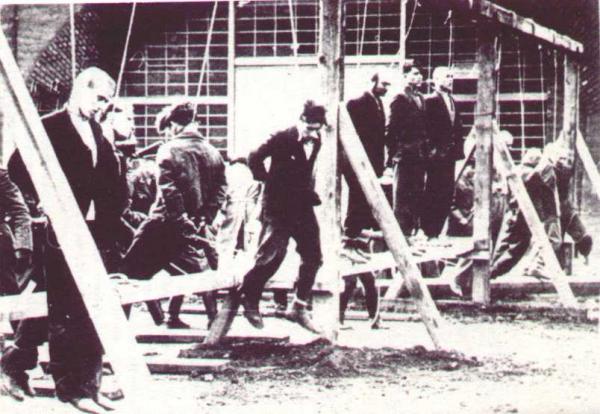
[1930s]
Inno dei “Navajos” di Colonia, gruppo di giovanissimi anti-hitleriani che si riconosceva nell’organizzazione degli “Edelweißpiraten”.
Testo originale e traduzione inglese da en.wikipedia
Se negli anni 30, quelli dell’avvento e del consolidamento del nazismo, gli Edelweißpiraten non furono che un’organizzazione giovanile di matrice scoutistica che si opponeva in modo spontaneistico all’autoritarismo e al militarismo cui erano improntati i gruppi giovanili nazisti, nel corso della guerra assunsero sempre di più una fisionomia resistenziale. Colonia fu la loro roccaforte, anche perché lì l’ombra della sconfitta del tracotante Terzo Reich fu visibile molto prima che altrove: la città fu infatti scelta dagli alleati come laboratorio della dottrina del bombardamento a tappeto e fu costantemente martellata fin dal maggio 1942 e quasi interamente distrutta.
Fu nelle cantine del quartiere... (Continues)
Inno dei “Navajos” di Colonia, gruppo di giovanissimi anti-hitleriani che si riconosceva nell’organizzazione degli “Edelweißpiraten”.
Testo originale e traduzione inglese da en.wikipedia
Se negli anni 30, quelli dell’avvento e del consolidamento del nazismo, gli Edelweißpiraten non furono che un’organizzazione giovanile di matrice scoutistica che si opponeva in modo spontaneistico all’autoritarismo e al militarismo cui erano improntati i gruppi giovanili nazisti, nel corso della guerra assunsero sempre di più una fisionomia resistenziale. Colonia fu la loro roccaforte, anche perché lì l’ombra della sconfitta del tracotante Terzo Reich fu visibile molto prima che altrove: la città fu infatti scelta dagli alleati come laboratorio della dottrina del bombardamento a tappeto e fu costantemente martellata fin dal maggio 1942 e quasi interamente distrutta.
Fu nelle cantine del quartiere... (Continues)
Des Hitlers Zwang, der macht uns klein,
(Continues)
(Continues)
Contributed by Bernart Bartleby 2015/5/20 - 15:53
Das weiche Wasser

[1988]
Testo / Lyrics / Text: Diether Dehm
Interpretata dall'autore e dai Bots
Performed by the author and by Bots
Interpretata dai Bots
Performed by Bots
È un curioso personaggio, Diether Dehm. Nato nel 1950 a Francoforte sul Meno, è sia un imprenditore discografico di successo, sia un cantautore assai engagé in proprio; ma notissima è anche la sua attività politica, che lo ha portato a far parte del Bundestag, il parlamento tedesco, dal 1994 al 2005. Nel 2015 ha annunciato il suo ritiro dalla scena politica attiva; aveva esordito nell' “ala sinistra” della SPD, la Sozialdemokratische Partei Deutschlands, ed è giustappunto questa sua canzone (conosciuta particolarmente nell'interpretazione dei Bots che qui conosciamo) che rappresenta da quando è stata scritta (1988) una sorta di “inno semi-ufficiale” del partito che fu del sig. Herbert Frahm, più noto come Willy Brandt; un nome... (Continues)
Testo / Lyrics / Text: Diether Dehm
Interpretata dall'autore e dai Bots
Performed by the author and by Bots
Interpretata dai Bots
Performed by Bots
È un curioso personaggio, Diether Dehm. Nato nel 1950 a Francoforte sul Meno, è sia un imprenditore discografico di successo, sia un cantautore assai engagé in proprio; ma notissima è anche la sua attività politica, che lo ha portato a far parte del Bundestag, il parlamento tedesco, dal 1994 al 2005. Nel 2015 ha annunciato il suo ritiro dalla scena politica attiva; aveva esordito nell' “ala sinistra” della SPD, la Sozialdemokratische Partei Deutschlands, ed è giustappunto questa sua canzone (conosciuta particolarmente nell'interpretazione dei Bots che qui conosciamo) che rappresenta da quando è stata scritta (1988) una sorta di “inno semi-ufficiale” del partito che fu del sig. Herbert Frahm, più noto come Willy Brandt; un nome... (Continues)
Europa hatte zweimal Krieg,
(Continues)
(Continues)
Contributed by Juha Rämö 2015/5/20 - 13:35
Am Atlantikwall
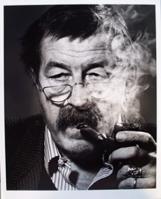
Noch waffenstarrend, mit getarnten Zähnen,
(Continues)
(Continues)
Contributed by Juha Rämö 2015/5/18 - 10:39
Unser täglich Brot (Der Lied von der Kuhle)
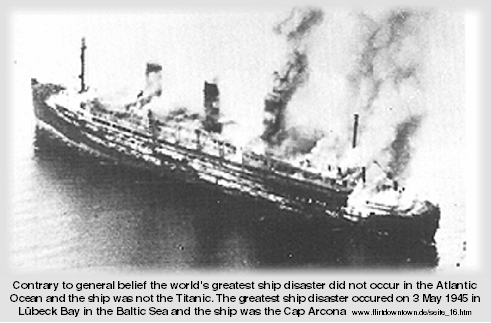
[1944]
Parole e musica di Emil František Burian (1904-1959), poeta, scrittore, cantante, musicista e compositore ceco.
Testo trovato su Volkslieder Archiv
Nella raccolta intitolata “Und weil der Mensch ein Mensch ist – Lager – Lieder – Widerstand” realizzata nel 2015 dal quartetto tedesco Die Grenzgänger (Michael Zachcial, Annette Rettich, Felix Kroll e Frederic Drobnjak).
Emil František Burian, che era pure un militante comunista, fu arrestato dai nazisti nel 1941 e venne internato a Theresienstadt, a Dachau e infine a Neuengamme. Questa canzone - che credo egli scrisse in tedesco perchè non mi pare ci sia traccia in Rete di un testo in ceco - fu composta proprio a Neuengamme, dove Emil František Burian era stato attivissimo nell’organizzare spettacoli clandestini di intrattenimento per gli internati (tra i quali quelli di lingua tedesca erano i più numerosi, dopo sovietici, polacchi... (Continues)
Parole e musica di Emil František Burian (1904-1959), poeta, scrittore, cantante, musicista e compositore ceco.
Testo trovato su Volkslieder Archiv
Nella raccolta intitolata “Und weil der Mensch ein Mensch ist – Lager – Lieder – Widerstand” realizzata nel 2015 dal quartetto tedesco Die Grenzgänger (Michael Zachcial, Annette Rettich, Felix Kroll e Frederic Drobnjak).
Emil František Burian, che era pure un militante comunista, fu arrestato dai nazisti nel 1941 e venne internato a Theresienstadt, a Dachau e infine a Neuengamme. Questa canzone - che credo egli scrisse in tedesco perchè non mi pare ci sia traccia in Rete di un testo in ceco - fu composta proprio a Neuengamme, dove Emil František Burian era stato attivissimo nell’organizzare spettacoli clandestini di intrattenimento per gli internati (tra i quali quelli di lingua tedesca erano i più numerosi, dopo sovietici, polacchi... (Continues)
Unser täglich Brot
(Continues)
(Continues)
Contributed by Bernart Bartleby 2015/5/16 - 14:51
Song Itineraries:
Extermination camps
Im Auschwitzlager wo ich wohnte

[1941]
Questa poesia fu composta in polacco nel 1941 dall’attore Tadeusz Kański (1902-1950) mentre si trovava prigioniero ad Auschwitz. Il titolo originario era “W Auschwitzlager gdy mieszkałem” ma non mi è riuscito di trovarne il testo. Invece sul Volkslieder Archive è disponibile il testo tradotto in tedesco.
I versi di Kański furono poi messi in musica nel 1944 da Aleksander Kulisiewicz, prigioniero a Sachsenhausen.
La canzone in polacco si trova nella raccolta di Kulisiewicz intitolata “Pieśni obozowe z hitlerowskich obozów koncentracyjnych 1939-45”, pubblicata nel 1979 dalla casa discografica polacca Muza.
La versione in tedesco di Doris Radojewski si trova nella raccolta “O bittre Zeit - Lagerlieder 1933-1945”
Tadeusz Kański è stato un attore, regista e sceneggiatore polacco attivo negli anni 20 e 30, conosciuto anche in Italia dove lavorò in alcune produzioni. Kański fu tra gli... (Continues)
Questa poesia fu composta in polacco nel 1941 dall’attore Tadeusz Kański (1902-1950) mentre si trovava prigioniero ad Auschwitz. Il titolo originario era “W Auschwitzlager gdy mieszkałem” ma non mi è riuscito di trovarne il testo. Invece sul Volkslieder Archive è disponibile il testo tradotto in tedesco.
I versi di Kański furono poi messi in musica nel 1944 da Aleksander Kulisiewicz, prigioniero a Sachsenhausen.
La canzone in polacco si trova nella raccolta di Kulisiewicz intitolata “Pieśni obozowe z hitlerowskich obozów koncentracyjnych 1939-45”, pubblicata nel 1979 dalla casa discografica polacca Muza.
La versione in tedesco di Doris Radojewski si trova nella raccolta “O bittre Zeit - Lagerlieder 1933-1945”
Tadeusz Kański è stato un attore, regista e sceneggiatore polacco attivo negli anni 20 e 30, conosciuto anche in Italia dove lavorò in alcune produzioni. Kański fu tra gli... (Continues)
Im Auschwitzlager, wo ich wohnte
(Continues)
(Continues)
Contributed by Bernart Bartleby 2015/5/12 - 11:18
Song Itineraries:
Extermination camps
Żywe Kamienie

Testo trovato su Volkslieder Archive
DIE LEBENDEN STEINE
(Continues)
(Continues)
Contributed by Bernart Bartleby 2015/5/5 - 23:57
Tanz, Mädchen

[1944]
Versi di Krystyna Żywulska (1914-1992, il cui vero nome era Sonia Landau), ebrea polacca, nativa di Łódź.
Sull’aria della popolare cecoslovacca “Ešče si já pohár vínka”, nell’adattamento che ne fece il musicista polacco Krzysztof Jażdżyński durante la permanenza, sua e della Żywulska, nel campo di sterminio nazista di Auschwitz-Birkenau.
Sono costretto – per il momento - a contribuire la versione tedesca dell’originale polacco, che non sono riuscito a trovare ad eccezione del frammento “Tańcz, tańcz dziewczyno / władze ci każą, z przyjemną miną / są dziś w humorze panowie śmierci, tańcz…”, i soli versi ricorrenti in Rete.
Dopo l’occupazione tedesca, Sonia Landau finì con la sua famiglia nel ghetto di Varsavia. Ma nel 1942 decise di passare all’azione: fuggì dal ghetto, adottò un’identità falsa (Zofia Wiśniewska) nella “parte ariana” della città e quindi si unì alla Resistenza.... (Continues)
Versi di Krystyna Żywulska (1914-1992, il cui vero nome era Sonia Landau), ebrea polacca, nativa di Łódź.
Sull’aria della popolare cecoslovacca “Ešče si já pohár vínka”, nell’adattamento che ne fece il musicista polacco Krzysztof Jażdżyński durante la permanenza, sua e della Żywulska, nel campo di sterminio nazista di Auschwitz-Birkenau.
Sono costretto – per il momento - a contribuire la versione tedesca dell’originale polacco, che non sono riuscito a trovare ad eccezione del frammento “Tańcz, tańcz dziewczyno / władze ci każą, z przyjemną miną / są dziś w humorze panowie śmierci, tańcz…”, i soli versi ricorrenti in Rete.
Dopo l’occupazione tedesca, Sonia Landau finì con la sua famiglia nel ghetto di Varsavia. Ma nel 1942 decise di passare all’azione: fuggì dal ghetto, adottò un’identità falsa (Zofia Wiśniewska) nella “parte ariana” della città e quindi si unì alla Resistenza.... (Continues)
Tanz, tanz schnell, Mädchen
(Continues)
(Continues)
Contributed by Bernart Bartleby 2015/5/5 - 09:57
Song Itineraries:
Extermination camps
Tango fasismin ja kapitalismin suhteesta

EIN TANGO VON DEM VERHÄLTNIS ZWISCHEN FASCHISMUS UND KAPITALISMUS
(Continues)
(Continues)
Contributed by Juha Rämö 2015/5/3 - 15:04
The Ballad of Nick & Bart [Here's To You]
![The Ballad of Nick & Bart [Here's To You]](img/thumb/c3392_130x140.jpeg?1328224498)
Euer Kampf, Nicola und Bart,
(Continues)
(Continues)
Contributed by dq82 2015/4/29 - 10:26
Der Beginn des Weltkrieges 1914 (unter Zuhilfenahme eines Tierstimmenimitators)
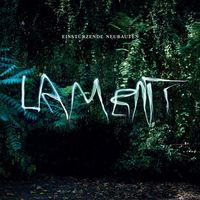
2014
Lament
The album version of LAMENT should be heard as a studio reconstruction of a work primarily designed to be performed live, rather than an official new Einstürzende Neubauten LP proper.
In truth, the piece can only be fully realised, as well as best experienced, in its physical embodiment, performed on or by founding member Andrew Unruh’s gigantic instruments and noise generating devices that visually evoke the horrors the work describes or embeds in the sounds they conjure from the filth and terror of the industrialised 20th century world at war with itself.
But in fulfilling what at first appears to be a surprise commission for such a formidable longtime outsider group, Einstürzende Neubauten transformed the earthy, idiosyncratic contents they mined from academic, state, music hall and internet archives with the help of their two researchers into a richly complex cycle of... (Continues)
Lament
The album version of LAMENT should be heard as a studio reconstruction of a work primarily designed to be performed live, rather than an official new Einstürzende Neubauten LP proper.
In truth, the piece can only be fully realised, as well as best experienced, in its physical embodiment, performed on or by founding member Andrew Unruh’s gigantic instruments and noise generating devices that visually evoke the horrors the work describes or embeds in the sounds they conjure from the filth and terror of the industrialised 20th century world at war with itself.
But in fulfilling what at first appears to be a surprise commission for such a formidable longtime outsider group, Einstürzende Neubauten transformed the earthy, idiosyncratic contents they mined from academic, state, music hall and internet archives with the help of their two researchers into a richly complex cycle of... (Continues)
Achtung
(Continues)
(Continues)
Contributed by dq82 2015/4/28 - 16:07
Song Itineraries:
World War I (1914-1918)
How did I die?

2014
Lament
The album version of LAMENT should be heard as a studio reconstruction of a work primarily designed to be performed live, rather than an official new Einstürzende Neubauten LP proper.
In truth, the piece can only be fully realised, as well as best experienced, in its physical embodiment, performed on or by founding member Andrew Unruh’s gigantic instruments and noise generating devices that visually evoke the horrors the work describes or embeds in the sounds they conjure from the filth and terror of the industrialised 20th century world at war with itself.
But in fulfilling what at first appears to be a surprise commission for such a formidable longtime outsider group, Einstürzende Neubauten transformed the earthy, idiosyncratic contents they mined from academic, state, music hall and internet archives with the help of their two researchers into a richly complex cycle of... (Continues)
Lament
The album version of LAMENT should be heard as a studio reconstruction of a work primarily designed to be performed live, rather than an official new Einstürzende Neubauten LP proper.
In truth, the piece can only be fully realised, as well as best experienced, in its physical embodiment, performed on or by founding member Andrew Unruh’s gigantic instruments and noise generating devices that visually evoke the horrors the work describes or embeds in the sounds they conjure from the filth and terror of the industrialised 20th century world at war with itself.
But in fulfilling what at first appears to be a surprise commission for such a formidable longtime outsider group, Einstürzende Neubauten transformed the earthy, idiosyncratic contents they mined from academic, state, music hall and internet archives with the help of their two researchers into a richly complex cycle of... (Continues)
I was in a crater
(Continues)
(Continues)
Contributed by dq82 2015/4/28 - 16:00
Song Itineraries:
World War I (1914-1918)
Lament

2014
Lament
The album version of LAMENT should be heard as a studio reconstruction of a work primarily designed to be performed live, rather than an official new Einstürzende Neubauten LP proper.
In truth, the piece can only be fully realised, as well as best experienced, in its physical embodiment, performed on or by founding member Andrew Unruh’s gigantic instruments and noise generating devices that visually evoke the horrors the work describes or embeds in the sounds they conjure from the filth and terror of the industrialised 20th century world at war with itself.
But in fulfilling what at first appears to be a surprise commission for such a formidable longtime outsider group, Einstürzende Neubauten transformed the earthy, idiosyncratic contents they mined from academic, state, music hall and internet archives with the help of their two researchers into a richly complex cycle of... (Continues)
Lament
The album version of LAMENT should be heard as a studio reconstruction of a work primarily designed to be performed live, rather than an official new Einstürzende Neubauten LP proper.
In truth, the piece can only be fully realised, as well as best experienced, in its physical embodiment, performed on or by founding member Andrew Unruh’s gigantic instruments and noise generating devices that visually evoke the horrors the work describes or embeds in the sounds they conjure from the filth and terror of the industrialised 20th century world at war with itself.
But in fulfilling what at first appears to be a surprise commission for such a formidable longtime outsider group, Einstürzende Neubauten transformed the earthy, idiosyncratic contents they mined from academic, state, music hall and internet archives with the help of their two researchers into a richly complex cycle of... (Continues)
DIE LIE DEN
(Continues)
(Continues)
Contributed by dq82 2015/4/28 - 15:44
Song Itineraries:
World War I (1914-1918)
Nein, nein, nein
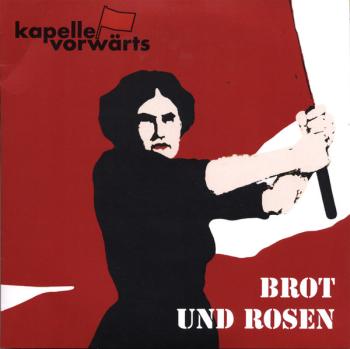
[2011]
Nel disco intitolato “Brot Und Rosen”
Nel disco intitolato “Brot Und Rosen”
Nein, nein
(Continues)
(Continues)
Contributed by Bernart Bartleby 2015/4/18 - 21:59
Гимн демократической молодёжи мира
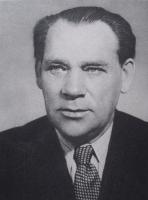
German translation by Walter Demel
Deutsche Nachdichtung von Walter Demel
Deutsche Nachdichtung von Walter Demel
WELTJUGENDLIED
(Continues)
(Continues)
Contributed by Juha Rämö 2015/4/8 - 22:09
Вы жертвою пали
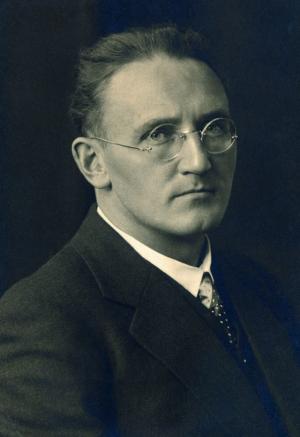
Unsterbliche Opfer: La versione tedesca di Hermann Scherchen
German version by Hermann Scherchen
Deutsche Nachdichtung von Hermann Scherchen
Hermann Scherchen, nato il 21 giugno 1891, è stato un grande musicista e direttore d'orchestra berlinese dalla vita assai avventurosa. Nel 1914 si trovava a Jūrmala, in Lettonia, per dirigere l'Orchestra Sinfonica di Riga; allo scoppio della guerra, fu trattenuto e internato come prigioniero in Russia in quanto cittadino di un paese nemico. In questo periodo, internato in un campo di prigionia negli Urali, continuò a dirigere, a tenere lezioni e a comporre; tra le altre cose, la versione tedesca di Вы жертвою пали (e anche di Смело, товарищи, в ногу, ovvero Brüder, zur Sonne, zur Freiheit!). Nel 1933 Scherchen, di simpatie comuniste, fuggì dalla Germania; visse per quasi tutta la vita in Svizzera, a Gravesano nel Canton Ticino. Morì il 12 giugno... (Continues)
German version by Hermann Scherchen
Deutsche Nachdichtung von Hermann Scherchen
Hermann Scherchen, nato il 21 giugno 1891, è stato un grande musicista e direttore d'orchestra berlinese dalla vita assai avventurosa. Nel 1914 si trovava a Jūrmala, in Lettonia, per dirigere l'Orchestra Sinfonica di Riga; allo scoppio della guerra, fu trattenuto e internato come prigioniero in Russia in quanto cittadino di un paese nemico. In questo periodo, internato in un campo di prigionia negli Urali, continuò a dirigere, a tenere lezioni e a comporre; tra le altre cose, la versione tedesca di Вы жертвою пали (e anche di Смело, товарищи, в ногу, ovvero Brüder, zur Sonne, zur Freiheit!). Nel 1933 Scherchen, di simpatie comuniste, fuggì dalla Germania; visse per quasi tutta la vita in Svizzera, a Gravesano nel Canton Ticino. Morì il 12 giugno... (Continues)
UNSTERBLICHE OPFER
(Continues)
(Continues)
Contributed by Juha Rämö 2015/4/7 - 15:24
Laudate Hominem

German translation by Michi and Herbert Killian
Deutsche Übersetzung von Michi und Herbert Killian
Da / From / Aus questo blog / this blog / diesem Blog
Deutsche Übersetzung von Michi und Herbert Killian
Da / From / Aus questo blog / this blog / diesem Blog
LOBET DEN MENSCHEN
(Continues)
(Continues)
Contributed by Juha Rämö 2015/4/6 - 13:46
Stempellied (oder Lied der Arbeitslosen)

[1929]
Parole di David Weber, pseudonimo di Robert Gilbert, a sua volta nome d’arte di Robert David Winterfeld (1899-1978), compositore, autore, cantante ed attore tedesco
Musica di Hanns Eisler
Brano interpretato da Ernst Busch in molti suoi dischi, a partire dal Lato B del singolo “Lied der Bergarbeiter” pubblicato nel 1931 e poi nella raccolta “Die goldenen zwanziger Jahre” pubblicata nella RDT nel 1964.
“Non un soldo in tasca, solo il buono con il timbro per ricevere il sussidio di disoccupazione…”
Una canzone molto celebre, “leggera” al modo di Gilbert, ma suprema descrizione e sintesi degli effetti della crisi del 1929 in Germania, certo non meno devastanti di quelli prodottisi negli USA, allora come oggi terra di origine del dissesto.
E allora come oggi identiche le cause, individuate e sintetizzate in particolare dall’economista americano John Kenneth Galbraith (1908-2006):... (Continues)
Parole di David Weber, pseudonimo di Robert Gilbert, a sua volta nome d’arte di Robert David Winterfeld (1899-1978), compositore, autore, cantante ed attore tedesco
Musica di Hanns Eisler
Brano interpretato da Ernst Busch in molti suoi dischi, a partire dal Lato B del singolo “Lied der Bergarbeiter” pubblicato nel 1931 e poi nella raccolta “Die goldenen zwanziger Jahre” pubblicata nella RDT nel 1964.
“Non un soldo in tasca, solo il buono con il timbro per ricevere il sussidio di disoccupazione…”
Una canzone molto celebre, “leggera” al modo di Gilbert, ma suprema descrizione e sintesi degli effetti della crisi del 1929 in Germania, certo non meno devastanti di quelli prodottisi negli USA, allora come oggi terra di origine del dissesto.
E allora come oggi identiche le cause, individuate e sintetizzate in particolare dall’economista americano John Kenneth Galbraith (1908-2006):... (Continues)
Keenen Sechser in der Tasche,
(Continues)
(Continues)
Contributed by Bernart Bartleby 2015/4/1 - 15:10
Song Itineraries:
The War of Labour: Emigration, Immigration, Exploitation, Slavery
Lied der Bergarbeiter
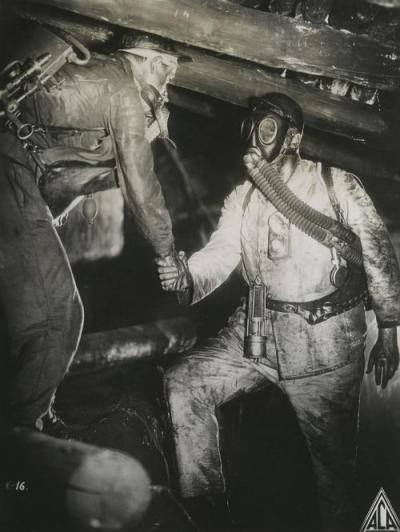
[1927]
Versi di Anna Gmeyner (1902-1991), scrittrice e drammaturga viennese, nella sua opera “Heer ohne Helden. Bergarbeiterschauspiel in 8 Bildern”, dalla quale nel 1931 il regista Georg Wilhelm Pabst trasse il film “Kameradschaft”, coproduzione franco-tedesca (in Francia uscì con il titolo “La tragédie de la mine”).
Musica di Hanns Eisler, composta nel 1929.
Interpretata da Ernst Busch in molti suoi dischi, compresi “Der Barrikaden-Tauber” e “Historische Aufnahmen”
Anna Gmeyner era austriaca ed era ebrea. Nel 1926 si trasferì in Scozia, perché il marito (lo scienziato Berthold P. Wiesner) aveva ricevuto un incarico all’Università di Edimburgo. Fu lì che la Gmeyner potè seguire le lotte dei minatori scozzesi, su cui scrisse l’opera da cui Ernst Busch e Hanns Eisler trassero poi questo brano. Nel 1928 la famiglia Wiesner si trasferì nella Berlino già tormentata dal nazismo e nel 1933 fecero appena in tempo a scappare, prima a Parigi e poi in Inghilterra. Anna Gmeyner è morta a York nel 1991.
Versi di Anna Gmeyner (1902-1991), scrittrice e drammaturga viennese, nella sua opera “Heer ohne Helden. Bergarbeiterschauspiel in 8 Bildern”, dalla quale nel 1931 il regista Georg Wilhelm Pabst trasse il film “Kameradschaft”, coproduzione franco-tedesca (in Francia uscì con il titolo “La tragédie de la mine”).
Musica di Hanns Eisler, composta nel 1929.
Interpretata da Ernst Busch in molti suoi dischi, compresi “Der Barrikaden-Tauber” e “Historische Aufnahmen”
Anna Gmeyner era austriaca ed era ebrea. Nel 1926 si trasferì in Scozia, perché il marito (lo scienziato Berthold P. Wiesner) aveva ricevuto un incarico all’Università di Edimburgo. Fu lì che la Gmeyner potè seguire le lotte dei minatori scozzesi, su cui scrisse l’opera da cui Ernst Busch e Hanns Eisler trassero poi questo brano. Nel 1928 la famiglia Wiesner si trasferì nella Berlino già tormentata dal nazismo e nel 1933 fecero appena in tempo a scappare, prima a Parigi e poi in Inghilterra. Anna Gmeyner è morta a York nel 1991.
Wir graben unsre Gräber,
(Continues)
(Continues)
Contributed by Bernart Bartleby 2015/3/31 - 17:11
Song Itineraries:
The War of Labour: Emigration, Immigration, Exploitation, Slavery
Ballade Von Den Baumwollpflückern
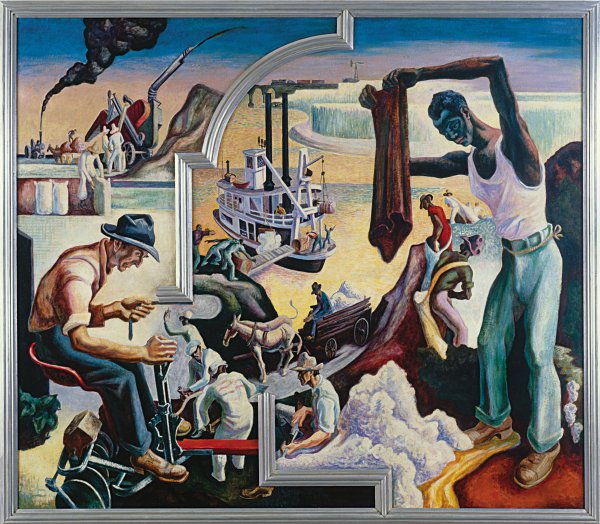
[1925/1929]
Testo rielaborato da Ernst Busch a partire dal racconto di B. Traven, misterioso scrittore tedesco trapiantato in Messico, intitolato “Die Baumwollpflücker”, pubblicato nel 1925.
Musica di Hanns Eisler, composta nel 1929.
Nei dischi “Der Barrikaden-Tauber” e “Historische Aufnahmen”
B. Traven è il nome di penna di uno scrittore misterioso, certamente tedesco, quasi certamente militante anarchico o spartachista durante la fase rivoluzionaria del 1918-19, che poi emigrò/fuggì in America, stabilendosi in Messico, quasi certamente in Chiapas, benchè l’unico suo contatto col mondo fosse una casella postale a Città del Messico. Beh, di certo vi è molto poco nella biografia di B. Traven: Erich Mühsam riteneva che si trattasse di tal Ret Marut, suo omologo in scrittura ed anarchia; due giornalisti investigatori inglesi scoprirono che il vero nome era Otto Feige, ospite per qualche... (Continues)
Testo rielaborato da Ernst Busch a partire dal racconto di B. Traven, misterioso scrittore tedesco trapiantato in Messico, intitolato “Die Baumwollpflücker”, pubblicato nel 1925.
Musica di Hanns Eisler, composta nel 1929.
Nei dischi “Der Barrikaden-Tauber” e “Historische Aufnahmen”
B. Traven è il nome di penna di uno scrittore misterioso, certamente tedesco, quasi certamente militante anarchico o spartachista durante la fase rivoluzionaria del 1918-19, che poi emigrò/fuggì in America, stabilendosi in Messico, quasi certamente in Chiapas, benchè l’unico suo contatto col mondo fosse una casella postale a Città del Messico. Beh, di certo vi è molto poco nella biografia di B. Traven: Erich Mühsam riteneva che si trattasse di tal Ret Marut, suo omologo in scrittura ed anarchia; due giornalisti investigatori inglesi scoprirono che il vero nome era Otto Feige, ospite per qualche... (Continues)
Es trägt der Bürger meine Gabe,
(Continues)
(Continues)
Contributed by Bernart Bartleby 2015/3/31 - 15:33
Song Itineraries:
The War of Labour: Emigration, Immigration, Exploitation, Slavery
×
![]()



